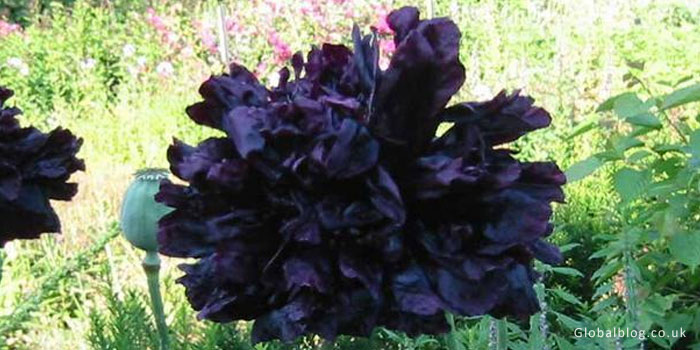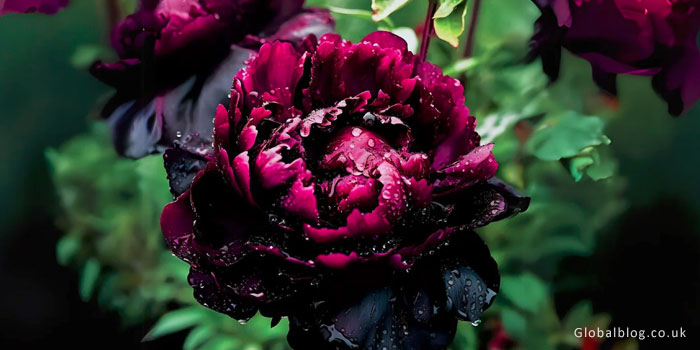Introduction to Black Peonies
Black peonies are a striking addition to any garden, captivating the eye with their deep, dark hues and lush petals. Unlike traditional peonies that flaunt lighter colors, black peonies evoke a sense of elegance and mystery. These unique blooms can transform your outdoor space into a dramatic floral wonderland.
Imagine walking through your garden and being greeted by these enchanting flowers, each one whispering tales of beauty and rarity. Whether you’re an experienced gardener or just starting out, cultivating black peonies can be a rewarding experience. In this guide, we’ll take you on a journey through everything you need to know about these exquisite plants, from their history to how best to care for them. Get ready to dive into the world of black peonies!
History and Meaning of Black Peonies
Black peonies carry a rich history intertwined with symbolism. Their deep, dark petals evoke mystery and elegance, making them captivating in gardens and floral arrangements alike.
Originating from ancient cultures, these flowers were often associated with power and prosperity. In Chinese tradition, peonies symbolize wealth and good fortune, while black varieties add an air of sophistication to the meaning.
Throughout history, black peonies have represented love’s complexity, passion intertwined with heartache. They are seen as a reminder that beauty can emerge even from darkness.
In modern times, they continue to enchant flower enthusiasts. Black peonies stand out for their uniqueness among the more common shades of pink or white. This rarity enhances their allure in both bouquets and garden designs. Their striking appearance ensures they remain a favorite for those seeking something extraordinary in floral artistry.
Types of Black Peonies
Black peonies come in several captivating varieties, each boasting unique characteristics. One popular type is the ‘Black Beauty,’ known for its dark, velvety petals that create a stunning contrast against lush green foliage. This variety often features rich burgundy tones, making it a favorite among gardeners.
Another striking option is the ‘Black Knight.’ With its deep plum hues and slightly ruffled blooms, this peony adds elegance to any garden landscape. It thrives well in sunny spots and can grow quite tall.
Then there’s the rare ‘Buckeye Belle,’ which displays an intriguing blend of blackish-red flowers with vibrant yellow stamens at their center. Its unusual color variation makes it a conversation starter.
Each type offers something special, ensuring you’ll find one that fits your gardening dreams perfectly. Whether for cutting or landscaping purposes, these beauties never fail to impress.
How to Grow and Care for Black Peonies
Growing black peonies requires attention to detail and a little patience. Start by the selecting to a great location with well-drained soil and plenty of sunlight. These plants thrive best in full sun, so aim for at least six hours of direct sunlight daily.
When planting, dig a hole about 2 feet wide and deep. Space your seeds or tubers approximately three feet apart to allow ample room for growth. Cover them lightly with soil, ensuring that the eyes are just below the surface.
Water thoroughly after planting but avoid overwatering. Black peonies prefer moist conditions without being soggy. Mulching helps keep hold of moisture while curbing weeds.
As they grow, support their heavy blooms with stakes if necessary. Regularly remove dead foliage to promote airflow around the roots and prevent disease development. Fertilize sparingly in early spring using a balanced fertilizer to encourage healthy growth throughout the season.

Common Pests and Diseases of Black Peonies
Black peonies, while stunning, can face threats from various pests and diseases. Aphids are a common nuisance. These tiny insects feed on the sap, weakening your plants over time.
Another concern is botrytis blight. This fungal disease appears as gray mold and thrives in damp conditions. It’s crucial to maintain good air circulation around your peonies to minimize this risk.
Additionally, root rot can occur if the soil remains overly wet. Ensure proper drainage when planting these beautiful flowers.
Keep an eye out for ants as well; they often accompany aphids and can exacerbate their damage by protecting them from natural predators.
Regular monitoring of your black peonies will help catch issues early. Healthy gardening practices make all the difference in keeping these beauties thriving amidst potential challenges.
Tips for Propagating Black Peony Seeds
Propagating black peony seeds can be a rewarding endeavor, but it requires patience and care. Start by collecting ripe seeds from healthy plants in late summer or early fall. Make sure to choose mature pods for the best results.
Before planting, stratify your seeds. This process mimics winter conditions, helping the seeds germinate more effectively. Place them in a damp paper towel inside a plastic bag and refrigerate for about six weeks.
When it’s time to plant, use well-draining soil enriched with organic matter. Sow the seeds at a depth of one inch and keep them moist but not soggy.
Consider starting your seeds indoors if you live in cooler climates. Transplant seedlings outdoors once they establish roots and temperatures warm up. With proper attention, you’ll soon enjoy beautiful blooms from your very own black peonies!
Where to Buy Black Peony Seeds
Finding black peony seeds can be an exciting adventure for any gardening enthusiast. Numerous online retailers specialize in rare and unique flower seeds, including the elusive black peonies.
Websites like Etsy or eBay often feature individual sellers who cultivate these stunning blooms. You can explore various options, ensuring you find seeds with good reviews from other buyers.
Local nurseries may also carry black peony plants or offer to order them upon request. Building a relationship with your local garden center could lead you to some hidden gems.
Don’t overlook specialty seed companies that focus on heirlooms and unique varieties. They frequently have well-cataloged selections that include sought-after flowers like black peonies.
Before purchasing, check the seed’s viability and germination rates to ensure you’re getting quality products for your garden project. Happy planting!
Conclusion: Black Peonies
Black Peonies are a stunning addition to any garden. Their rich, dark hues and luxurious blooms carry a sense of mystery and elegance that captivates the eye. Throughout history, they have symbolized various meanings from prosperity to honor, making them not just beautiful flowers but also significant cultural icons.
Growing these magnificent plants can be rewarding with proper care and attention. By understanding their needs, such as sunlight, soil quality, and watering, you can ensure your black peonies thrive year after year. Being mindful of common pests and diseases will help protect your investment in time and resources.
